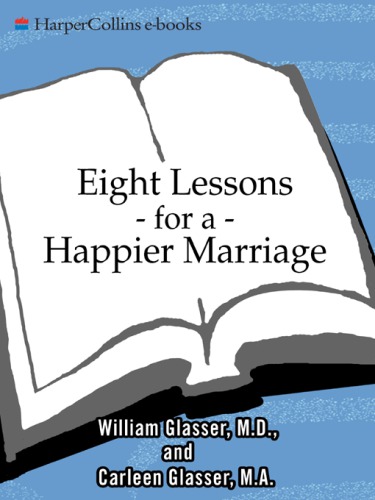
Eight Lessons for a Happier Marriage
کتاب های مرتبط
- اطلاعات
- نقد و بررسی
- دیدگاه کاربران
نقد و بررسی

May 7, 2007
P
sychiatrist William Glasser, founder of an eponymous institute, and his wife, Carleen, who teaches relationship workshops there, follow earlier relationship books (Getting Together and Staying Together
) by laying out the secrets to a happy marriage through what they refer to as choice theory, a simple enough, commonsense theory based on the premise that every action and reaction is a personal choice and can therefore be controlled. Many of the Glassers' tips are mere rehashings of what other books on the market already have to offer. The Glassers list the Seven Deadly Habits of marriage (criticism, blaming, complaining, nagging, threatening, punishing and bribing) and recommend replacing them with positive habits like supporting and encouraging. Another concept the authors introduce is the “quality world,” which is defined as “a feel good world created from our own most pleasurable feelings.” It's necessary to know and negotiate around each other's quality worlds (he likes wine with dinner; she abhors it). At a mere 112 pages, this is a quick read, and the comics and case studies at the beginning of each chapter aid in illustrating the lessons in a way that makes them even easier to understand.

June 15, 2007
Psychiatrist Glasser ("Reality Therapy in Action") resurrects his central tenets in this slim self-help volume cowritten with wife Carleen, his collaborator on similar books (e.g., "Getting Together and Staying Together: Solving the Mystery of Marriage"). Invoking his therapeutic mantra that we can only control our own behavior and not that of others, Glasser presents eight case histories of couples with marital troubles whom the Glassers have counseled and provides steps for executing the right choices to avoid similar difficulties. While these lessons are at times intuitively obvious, Glasser makes cogent observations that can be readily implemented. First, he advocates relinquishing attempts to exert external control, arguing that we should instead focus on choices geared toward changing ourselves. Also, he writes, acquainting ourselves with our partners' "quality world," or reality, will assist in improving our relationships. While these suggestions may aid those experiencing relationship problems, the book is no panacea. Like Thomas A. Harris's "I'm OKYou're OK" and Eric Berne's "Games People Play: The Basic Handbook of Transactional Analysis", it is destined for transience. Recommended for large public libraries.Lynne Maxwell, Villanova Univ. Sch. of Law Lib., PA
Copyright 2007 Library Journal, LLC Used with permission.

























دیدگاه کاربران